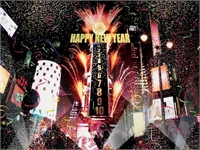
When the Year Draws to an End, Break Out in Song
Important Notice: Our web hosting provider recently started charging us for additional visits, which was unexpected. In response, we're seeking donations. Depending on the situation, we may explore different monetization options for our Community and Expert Contributors. It's crucial to provide more returns for their expertise and offer more Expert Validated Answers or AI Validated Answers. Learn more about our hosting issue here.

When the Year Draws to an End, Break Out in Song
You must be logged in to post a comment.
Would you sing a song in a foreign language if you didn’t know what the words meant? Before you answer this incorrectly, keep in mind that you probably do, every year, on New Year’s Eve.
Robert Burns, the famous Scottish poet, is credited by some as authoring Auld Lang Syne in 1788, though the poem is likely far older than that. And while you are no doubt familiar with the first verse and the chorus, you probably don’t know the translation of the words “auld lang syne,” though you likely have a pretty good idea of their meaning. From the old Scottish Gaelic to modern English, it can mean, “times gone by,” “old long since,” or “old long ago,” though they all amount to basically the same thing, which is an appropriate sentiment for bidding farewell to the year just passed. If, like me, you have faked knowing the words commonly sung on New Year’s Eve and substituted nonsense, such as, “Should older Quakers be forgot, and never there to find? Should older Quakers be forgot, for shakes and almond time?” here is the actual first verse:
Should auld acquaintance be forgot,
And never brought to min’?
Should auld acquaintance be forgot,
And days o’ auld lang syne?
Frankly, I think it’s silly that we sing this song at midnight on New Year’s Eve. Sure, I understand the sentiment; but rather than reflecting on times past, shouldn’t we be glad the year is finally over and look forward to, hopefully, a better year to come? Also, this is just another example of how we Americans refuse to throw off the stagnating influence of our European roots. First, there was the Greek craze, then the Italian craze, then the Irish craze—and here we are singing an ancient Scottish song whose words we don’t even understand. We might as well break out the oom-pah band and sing, “Roll out the Barrel.” Why can’t some American come up with a uniquely American New Years Eve song, something along the lines of, “Thank God that year’s ended; let’s get drunk tonight and hope that next year isn’t even worse!”
Still, I doubt that we’ll ever be rid of this old traditional snoozer. So this December 31, when midnight rolls around and if you feel like impressing your likewise inebriated friends, sing them the entire song:
Should auld acquaintance be forgot,
And never brought to min’?
Should auld acquaintance be forgot,
And days o’ lang syne?
We twa hae rin about the braes,
And pu’d the gowans fine;
But we’ve wander’d monie a weary fit
Sin’ auld lang syne.
We twa hae paidl’t i’ the burn,
Frae mornin’ sun till dine;
But seas between us braid hae roar’d
Sin’ auld lang syne.
And here ‘s a hand, my trusty fiere,
And gie’s a hand o’ thine;
And we’ll tak a right guid-willie waught
For auld lang syne.
And surely ye’ll be your pint-stowp,
And surely I’ll be mine;
And we’ll tak a cup o’ kindness yet
For auld lang syne!
For auld lang syne, my dear,
For auld lang syne,
We’ll tak a cup o’ kindness yet
For auld lang syne.
Just don’t ask me what all that means.